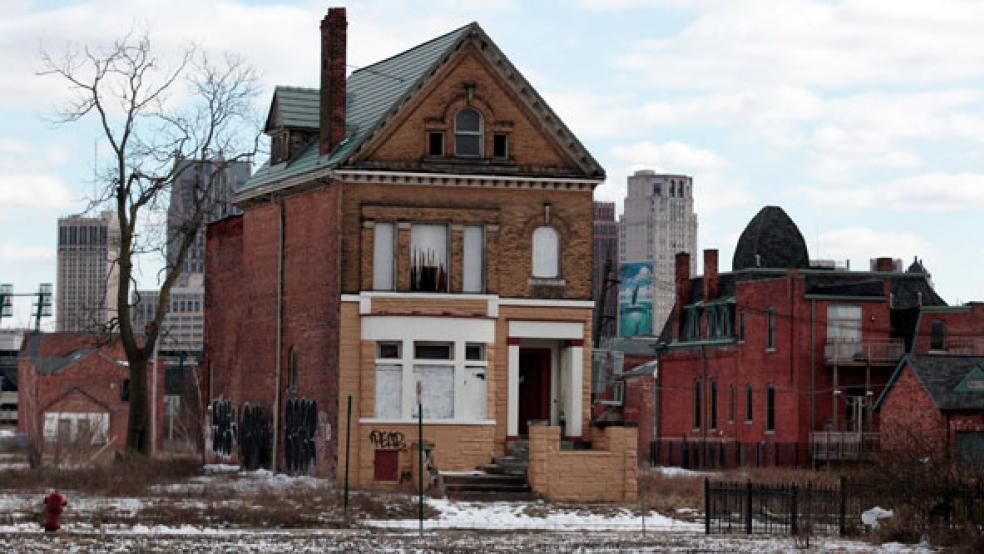When former basketball star Dave Bing took over as mayor of Detroit in 2009, he thought he could tackle the city’s massive economic and financial problems, in part by shrinking or consolidating much of the sprawling Motor City and even converting abandoned and blighted real estate to farmland.
The mayor’s hopes and plans seem incredibly naïve today, as a report on Monday showed Detroit’s financial picture is even bleaker than earlier portrayals. Kevyn D. Orr, the emergency manager appointed by Michigan Gov. Rick Snyder, described long-term obligations of at least $15 billion, unsustainable cash flow shortages and credit ratings so incredibly low Detroit may have trouble continuing to borrow.
This once-proud city – the “arsenal of democracy” during World War II and the car capital of the world – has languished for decades. Hundreds of thousands of manufacturing jobs were lost to other states and other countries; a once-vibrant population of 1.85 million in the 1950s dwindled to a mere 700,000 by last year; and riots and freeway construction over the past four decades rendered huge swaths of the city a moonscape of abandoned and burned out houses and garbage-strewn vacant lots.
The city’s economic outlook only weakened during the Great Recession and a seemingly relentless series of political scandals and government spending outrages. And even with the recent recovery of the auto industry and economic revival downtown and along the riverfront, the city continues to face difficult economic conditions. That includes a nearly 10 percent unemployment rate, a significant reduction in state revenue sharing, and decreases in income and property taxes.
“No one should underestimate the severity of the financial crisis,” Orr said in a statement over the weekend. “The path Detroit has followed for more than 40 years is unsustainable and only a complete restructuring of the city’s finances and operations will allow Detroit to regain its footing.”
Among Orr’s findings in a report filed with the Michigan treasurer:
Detroit’s expenditures have exceeded revenues by an average of $100 million a year between 2008 and 2012, and these operating deficits have been covered with long-term borrowing. This year alone, the city issued $137 billion in bonds to cover revenue shortfalls.
The city will run out of cash unless it defers payments on its obligations, including contributions to city employee pension programs. As of April 26, the city had just $64 million in cash on hand but $226 million in obligations in loans, property tax distributions and deferred pension contributions.
Detroit has the lowest credit rating of any U.S. city – below even investment grade or junk bond status. The city’s credit ratings – just B/B, according to Standard & Poor’s, CCC/CC, according to Fitch and Caa1/Caa2, according to Moody’s B/B – have been
deteriorating rapidly in recent years and are at historical lows, reflecting the distressed financial condition of the City.
Retirees from the city now outnumber current workers by more than two to one, which has created overwhelming pension and health care costs that the city can’t keep up with. Detroit has$5.7 billion in unfunded retiree health care costs.
Detroit’s police department, led by five chiefs over the past five years, suffers from “extremely low” efficiency, effectiveness and morale. The fire department has 52 facilities but as many as 12 may be out of service on any given day due to staffing and equipment constraints.
At least 60,000 parcels of land across the city are vacant, as are 78,000 buildings.
Bing, a former Detroit Pistons super star and business executive, said Sunday, “My initial review is that the assessment by Mr. Orr of the city’s financial condition is consistent with my administration’s findings.”
Orr said that his goals include hiring a third-party expert to restructure the city’s fire and transportation services for an overhaul similar to one underway in the Detroit Police Department aimed at getting more officers on the street and out of desk duties. He will also seek cooperation from the state and Wayne County on better ways to tackle blight and the city’s estimated 78,000 vacant structures, about 38,000 of which are in potentially dangerous shape. He will also attempt to eliminate redundant functions and consolidate where necessary. Orr will seek reductions in principal amounts the city owes in loans and bonds, as well as longer repayment terms and lower interest rates to sharply reduce an unsustainable debt load.
And perhaps most importantly, bargain further concessions from the city’s labor unions and seek to reduce or eliminate health care plans for 28,500 city employees active or retired.
For sure, there have been many attempts to save Detroit since the urban renewal efforts of the 1960s. Back in 2010, for example, Bing and other city leaders sought ways to literally shrink this sprawling city into an interconnected urban center, able to offer the jobs, housing and good schools essential to enticing the middle class back to the city. Bing focused on right-sizing his city and its government.
Bing’s controversial plan called for demolishing 10,000 dangerous residential structures over four years, greening the city with urban farms, closing 41 school buildings as part of a major consolidation and enhancement of the school system, building a light rail system to connect the downtown to outlying areas, and scores of other initiatives.
While many of those plans now look mostly like pie in the sky, there has been some tangible progress made in trying to transform Motown’s economy. Detroit native Dan Gilbert, the fabulously wealthy founder and chairman of Quicken Loans, is attempting to revive two square miles in the heart of downtown Detroit. To do so, he has already spent roughly $1 billion acquiring nearly three million square feet of real estate, and is ready to close another deal, for the Greektown Casino-Hotel and nearby parking lots, that will add one million more square feet to his holdings.
With this city so deep in the hole, will other investors roll the dice on Motown?


